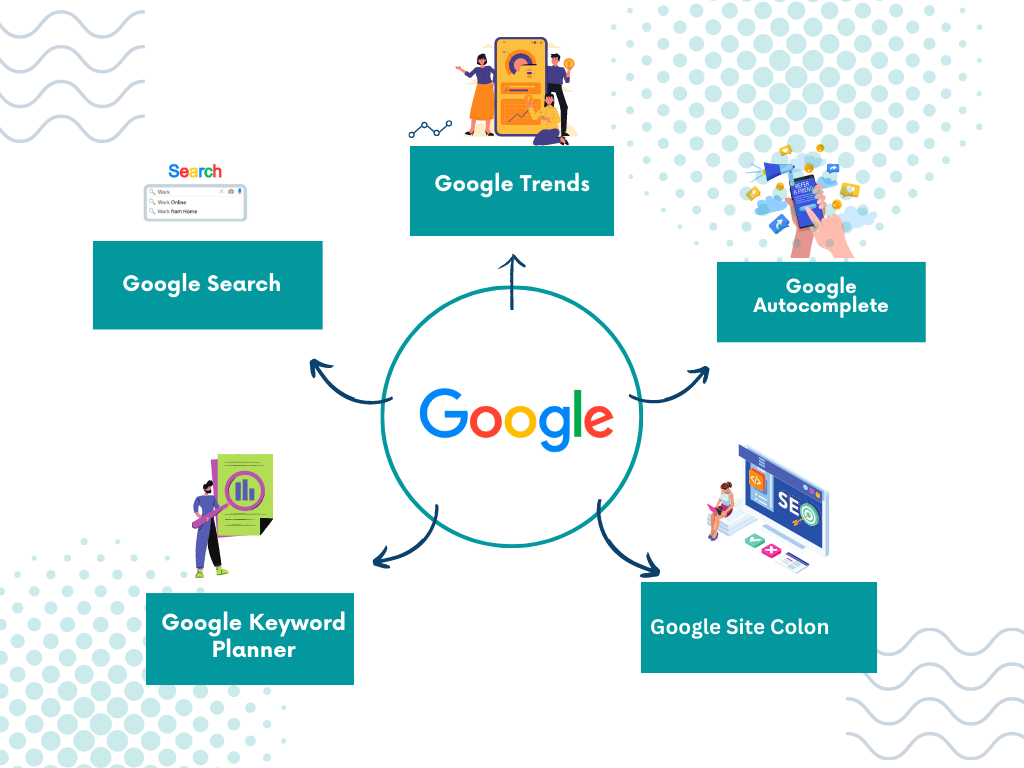Keyword Scouting: Discovering Your Audience’s Unspoken Needs
Today, we’re exploring a concept that’s making waves in the marketing world. It’s something you may not have heard of yet – “copy stalking.” But worry not, we’re not talking about anything shady here. This term refers to a strategy that involves closely observing and using your target audience’s questions and language to shape your marketing and content creation. However, let’s coin our own term for it: “Keyword Scouting.” Sounds adventurous, doesn’t it?
The Art of Keyword Scouting
Keyword Scouting, or “copy stalking,” which is a term coined by Jai Long, is a technique marketers use to tune into the unspoken needs of their audiences. This approach involves closely observing and analyzing the questions, comments, and discussions initiated by potential customers or followers across various platforms.
Where to Start: Locating Your Audience
The process begins with finding the digital spaces where your audience hangs out. These spaces could range from social media platforms like Facebook, LinkedIn, and Twitter, to professional forums, or even comment sections of related blogs and articles. It’s about diving deep into these interactions and picking up the frequently asked questions, common concerns, and shared interests. In this ocean of public opinion, these are your pearls.
Recognizing Patterns: The Pearls and Golden Tickets
Once you’ve collected these ‘pearls,’ you start to see patterns – a collective voice crying out for answers. And these cries, my friends, are your golden tickets. They serve as fuel for your website content, your next social media post, or even your upcoming online course idea. The genius of Keyword Scouting lies in the simple fact that it allows you to create content that’s already in demand.
Seizing Opportunities: Creating Demand-Based Content
Imagine this: you’re exploring an online forum, diving into a thread where presentation topic ideas are stirring up a buzz. Amid the digital chatter, you sense a palpable frustration. Users are grappling to discover fresh, captivating subjects for their presentations. Suddenly, it hits you – an insight, a flash of inspiration. This is your perfect chance to craft a blog post, something like, “Unveiling 2023’s Top 10 Game-Changing Presentation Topic Ideas.”
Why Keyword Scouting is a Game-Changer
You might wonder, though, why this approach is such a game-changer. Here’s the secret: with Keyword Scouting, you’re doing more than simply providing answers. You’re digging deep, addressing real, gnawing needs – solving problems that keep people up at night. The role you play evolves from a standard content creator or course designer into a solution provider, a value-adder amidst the internet’s noise.
Establishing Credibility with Your Audience
But it doesn’t stop there. This method is also a tool for carving out your credibility within your field. It signals to your audience that you’re dialed into their challenges, ready to spring into action with solutions. And what does this yield? It fosters trust, sparks increased engagement with your content, and more importantly, positions you as the go-to person when they encounter similar hurdles in the future. Quite powerful, isn’t it?
The Power of ‘Table Topic’ Ideas
One of the most potent territories where Keyword Scouting can reap significant benefits is within the realm of ‘table topic’ ideas. If you’re unfamiliar with this term, let me elucidate. ‘Table Topics’ are on-the-spot speech topics that are primarily used within Toastmasters International clubs. These impromptu speeches are designed to test members’ quick thinking and communication skills, making them a compelling tool for personal and professional development.
Why ‘Table Topic’ Ideas Matter to Content Creators and Marketers
But why are ‘table topic’ ideas so relevant to you as a content creator, instructional designer, or marketer? The answer lies in their inherent ability to spark interesting, engaging, and diverse discussions. This makes them an excellent source of inspiration for blog posts, podcasts, or even course content.
Immersing Yourself in Table Topic Communities
The first step is to immerse yourself in the vibrant communities where these ‘table topic’ discussions take place. This could be an online forum of a local Toastmasters club, a LinkedIn group dedicated to public speaking, or a Facebook group for corporate training professionals. As you delve into these dialogues, you’ll begin to notice recurring questions or concerns.
Recognizing Content Opportunities in Everyday Queries
For instance, you might come across a myriad of questions like, “How can I improve my public speaking skills?” or “What are some engaging table topic questions to ignite a team meeting?” It’s easy to overlook these as ordinary queries, but to a keyword scout, they’re treasure troves of content opportunities.
Transforming Queries into Comprehensive Content
Picture a query such as, “How can I improve my public speaking skills?” Now, don’t just see it as a plain question. Rather, visualize it as a call for help. It’s a call from an individual, craving personal growth, striving for more confidence, hungry for career advancement. With your newfound insight, you’re ready to respond. Not with a simple answer, but with a comprehensive blog post or an online course thoughtfully titled, “A Comprehensive Guide to Improve Your Public Speaking Skills.”
Responding to Team Engagement Challenges with Table Topic Inspired Content
Similarly, the question “What are some fun table topic questions to engage a team?” gives you a peek into the challenges team leaders face when trying to engage their team members. You can respond to this need by creating an article like “5 Fun Table Topic Questions to Ignite Your Next Team Meeting” or even an eBook on “100 Creative Table Topic Questions for Team Engagement.”
Building Your Next Course with Keyword Scouting
The power of Keyword Scouting stretches far beyond the boundaries of blog posts or social media updates; it can also be a transformative tool in identifying resonant course topics. As an instructional designer or an online course creator, tapping into the collective consciousness of your potential students can provide invaluable insight into their learning needs and aspirations.
Tuning into the Learning Needs of Your Community
Imagine you’re part of a professional community, be it on LinkedIn, a dedicated forum, or a Facebook group, where users frequently ask about ways to enhance their leadership skills. These queries might range from “How can I become a more persuasive leader?” to “What strategies can improve my team management skills?” To an observant content creator, these are not just random questions; they are an indicator of a potential gap in the market—an unmet need.
Creating Demand-Driven Online Courses
So, what’s next? You take these insights and create an online course titled “Effective Leadership Skills in the Modern Workplace.” You craft modules that address the challenges and queries your potential students have expressed. This approach doesn’t just give you a course idea; it gives you a course that’s already in demand, a course tailored to fill a real-world need.
The Dual Power of Keyword Scouting
The real magic of Keyword Scouting lies in its dual power. On one end of the spectrum, it gifts you the ability to create content that hits home with your audience, directly addressing their questions, fulfilling their needs, and helping them reach their dreams. This essentially ensures that your course strikes a chord with your audience and offers tangible value. In return, this amplifies their satisfaction and the odds they’ll pass on your course name to others like a recommendation relay.
Keyword Scouting and SEO
Flipping the coin, we see another advantage of Keyword Scouting – its role as a sturdy pillar in your SEO (Search Engine Optimization) strategy. When your course description, title, and content directly address frequently asked questions and incorporate relevant keywords, you boost the chances of your course appearing in search engine results. Remember those keywords from your list like online course ideas or course topics? These aren’t just phrases; they’re the pathway to visibility in the bustling online market.
Optimizing Course Discoverability
By weaving in these keywords organically into your course content, you optimize your course’s discoverability. The result is a double win: a course that’s valuable to your audience and visible to search engines. You’re not just creating a course; you’re creating an opportunity—for your audience to learn and for your content to be discovered and appreciated.
The Takeaway
On the surface, Keyword Scouting might seem straightforward, almost simplistic. Yet, lurking beneath this apparent simplicity is a tool with transformative potential that could entirely reshape your content creation process.
Picture yourself – the content creator, the marketer. Now, visualize yourself wielding this strategy to bring your work into sharper alignment with your audience’s unique pains, interests, and ambitions. Sounds empowering, doesn’t it?
Immerse yourself in the virtual habitats where your audience lingers. Listen. Really listen. Hear their questions, their concerns, their discussions. As you do, you’ll gain an understanding, a profound one, laced with nuances of what they truly need. With such valuable insight within your grasp, you’re perfectly positioned to sculpt content, to steer your marketing endeavors, that respond to these needs with both precision and imagination.
But the beauty of this bespoke approach doesn’t stop at merely boosting your content’s visibility. It revs up audience engagement, stokes conversion rates, and forges content that is not just relevant and useful, but truly captivating – a trio of characteristics marking the pinnacle of content success.
Creating a Vibrant Dialogue
However, remember, Keyword Scouting is more than just a tactic for extraction. It’s not a one-way ticket. Instead, it creates a vibrant dialogue. As you deploy this strategy, you’re providing value – and lots of it – to your audience. You’re resolving their queries, supplying solutions for their hurdles, and delivering resources that fuel their growth.
The act of giving doesn’t just etch your image as a niche expert; it also builds trust, and forges a bond that transcends the digital divide. It’s a connection, real and genuine, between you and the people you serve. This, dear reader, is the transformative power of Keyword Scouting.
Yet, the power of Keyword Scouting doesn’t stop there. It also facilitates connections and collaborations within your industry. Whether it’s by acknowledging the contribution of others in your blog posts or reaching out to fellow professionals for input or joint projects, this strategy encourages networking and collaboration. This can help you expand your professional circle, gain new insights, and potentially create opportunities for co-creation and mutual growth.
The Excitement of Discovery
But perhaps the most exciting aspect of Keyword Scouting is its potential for discovery. Your next viral blog post, your bestselling online course, or your most shared eBook could be lying in plain sight, nestled within a forum thread or a comment on a Facebook group post. These golden nuggets of content inspiration are there for the taking—you just have to listen, observe, and then create.
Keyword Scouting is more than just a strategy; it’s a mindset. It’s about adopting a stance of curiosity, empathy, and responsiveness toward your audience. It’s about understanding that your audience’s needs are central to your content creation process and that by addressing these needs, you’re creating content that’s impactful, valuable, and memorable.
So, why wait? The adventure of Keyword Scouting is yours to embark on today. Listen to your audience, harness their questions, and let their needs guide you to create content that resonates, engages, and, ultimately, makes a difference. To dive deeper into the concept of “copy stalking” and its various applications in marketing strategies, I highly recommend checking out this informative piece by Jai Long. In it, he elaborates on the ins and outs of this unique strategy and how it can provide significant insights to tailor your content and marketing efforts effectively.






